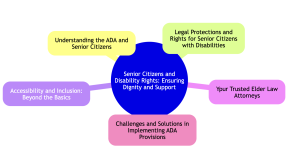
Digital Assets and Your Estate Plan: What You Need to Know
April 3, 2024
Understanding Social Security Benefits: A Guide for Seniors in Montana
May 1, 2024Living A Full Life with Disability Rights
“Growing old is mandatory, but growing up is optional.” – This witty remark, often attributed to Walt Disney, sheds light on aging with a blend of humor and wisdom. Yet, when it comes to disability rights for senior citizens, the matter is anything but light-hearted.
The Americans with Disabilities Act (ADA) is a critical legal framework guaranteeing the dignity and support of seniors with disabilities. The ADA is major for the financial planning of families and disabled individuals across the country.
Key Takeaways
- ADA’s major role: Acts as the cornerstone of legal protections for seniors with disabilities.
- Rights awareness: Many seniors are unaware of their rights under the ADA.
- Accessibility is key: Physical and digital accessibility is a fundamental requirement.
- Effective communication: Tailoring communication to meet diverse needs enhances inclusion.
- Supportive network: The ADA National Network offers indispensable resources and guidance.

Understanding the ADA and Senior Citizens
The ADA is a significant piece of legislation that provides a lifeline for senior citizens living with a disability in their golden years.
This law gives disabled older adults the same opportunities as everyone else to participate in mainstream society. From accessible public spaces to reasonable accommodations in the workplace, the ADA’s provisions touch on various aspects of daily life that many take for granted.
ADA Titles and Their Relevance to Seniors
- Title I (Employment): Protects seniors in the workforce – outlines fair treatment and reasonable accommodations.
- Title II (State and Local Government Services): Ensures access to public services and facilities.
- Title III (Public Accommodations): Makes sure businesses and non-profit service providers are accessible.
- Title IV (Telecommunications): Guarantees accessible telephone and internet services.
- Title V (Miscellaneous Provisions): Includes protections against retaliation and coercion.
The ADA National Network’s Role in Disability Rights
Providing Information and Support
The ADA National Network is a valuable resource that offers a wealth of information tailored to the needs of seniors with disabilities.
Whether it’s deciphering legal jargon or finding local resources, this network is a go-to source for empowerment.
Advocacy and Awareness
Another impactful function of the ADA National Network is raising awareness about the rights of senior citizens under the ADA.
It plays a big role in advocating for changes that make our society more inclusive.
Training and Education
Through workshops, webinars, and educational materials, the ADA National Network educates seniors, caregivers, and service providers about the ADA, promoting a deeper understanding of disability rights.
Answering Questions
Got a question about the ADA?
The ADA National Network is ready to providing clarity and guidance to seniors and their families.
The ADA and its National Network offer a solid foundation of support and information, giving senior citizens with disabilities the chance to lead dignified and supported lives. By understanding these resources and how to access them, seniors and their advocates can take full advantage of the protections and opportunities provided under the law.
Legal Protections and Rights for Senior Citizens with Disabilities
A robust legal framework shields senior citizens with disabilities, primarily the Americans with Disabilities Act (ADA).
This law means they have equal access to public life, from employment to transportation. The ADA dismantles physical and digital barriers to create a more inclusive society.
The Age Discrimination in Employment Act (ADEA) provides another layer of protection, preventing discrimination against older workers.
Again, awareness and advocacy are important. Knowing one’s rights is the first step, and standing up for these rights is the next. Having laws on paper is great, but it is better to bring them to life through active participation and advocacy.
Accessibility and Inclusion: Beyond the Basics of Disability Rights
The ADA doesn’t just talk the talk – when it comes to making life more navigable for seniors with disabilities, it stands firm. Accessibility goes beyond ramp installations and reaches into the digital realm and the very fabric of community life.
- Accessible websites: Access to information and services are just a click away for everyone.
- Local event participation: Community events must be accessible, promoting inclusion and social participation.
- Public transportation: Making sure buses, trains, and taxis are accessible so that travel isn’t a hurdle.
- Accessible housing: Adapting homes to meet the needs of those with mobility challenges.
- Community resources: Providing easy access to resources like healthcare, recreation, and support services.
Disability Rights: Challenges and Solutions in Implementing ADA Provisions
Implementing ADA provisions isn’t always straightforward.
Older adults, in particular, face several hurdles in accessing their rights under the law. These challenges range from lack of awareness about the ADA to physical barriers in public spaces. But for every obstacle, there’s a potential solution waiting in the wings, ready to make accessibility a reality for everyone. (1)
Challenges vs. Solutions
| Challenges | Solutions |
| Many seniors aren’t aware of their ADA rights. | Launch educational campaigns targeting seniors and caregivers. |
| Existing buildings and transportation may not be fully accessible. | Offer incentives for businesses to improve accessibility features. |
| The move towards digital services can exclude those not tech-savvy. | Provide training programs on digital tools and ensure websites are ADA compliant. |
| Essential information isn’t always accessible to those with sensory disabilities. | Utilize various communication methods (e.g., Braille, sign language services). |
| Navigating ADA compliance can be daunting. | Increase access to legal advice and support services for seniors. |
Final Thoughts – Your Trusted Elder Law Attorneys for Disability Rights
This discussion has outlined the impact of the ADA in improving the quality of life for seniors with disabilities.
The ADA has made major improvements in promoting fairness and respect. Yet, realizing its full potential involves overcoming a series of hurdles, each requiring a proactive response.
Elder law professionals, such as the dedicated team at Montana Elder Law, are leading the charge in addressing these challenges.
Their work extends beyond legal advice – acting as connectors and advocates and striving for a world where every older individual receives the recognition and support they deserve.
Reflecting on the ADA’s influence, it’s evident that our collective dedication to these principles actively contributes to a richer, more inclusive community. An accessible society benefits us all, steering us towards a time when the ideals of dignity, respect, and assistance are tangible experiences for every senior.
If you would like to learn more, visit Montana Elder Law’s Homepage for more resources.
References:
(1) Disability Rights Montana, https://disabilityrightsmt.org/

